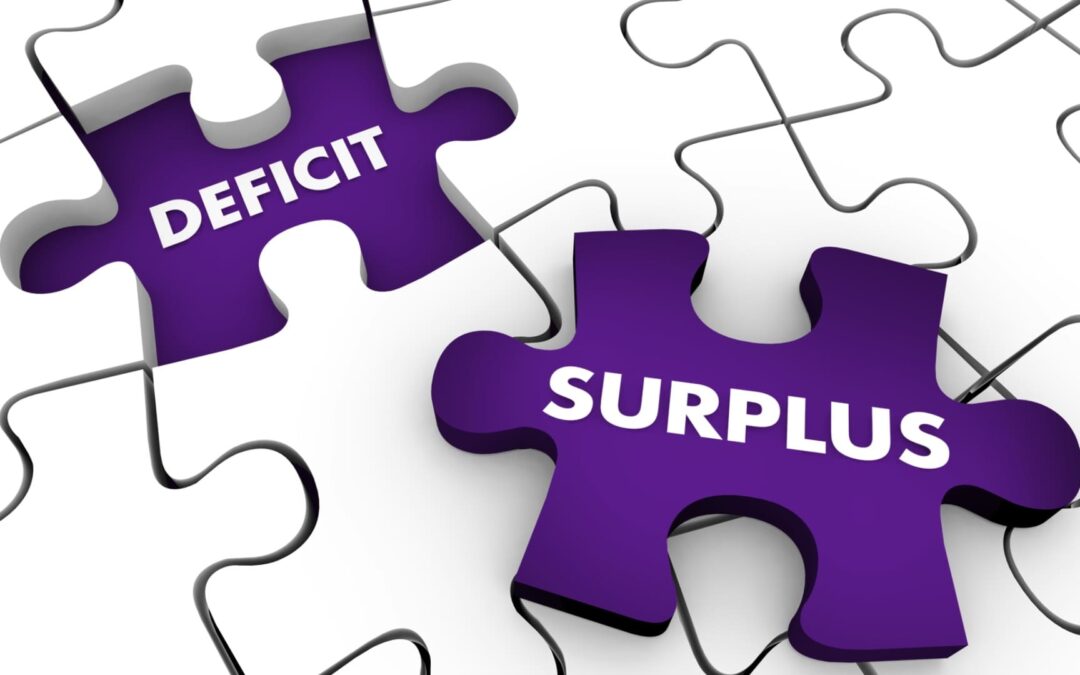Budget surplus and deficit are two key concepts in public finance that can have a major impact on government policy. Budget surplus occurs when total income exceeds total expenditure, while budget deficit is the opposite – when expenditure exceeds income.
These terms may seem simple enough, but they have significant consequences for public policy. They also provide opportunities for governments to use fiscal policies to address imbalances between the two.
Let us explore what these terms mean, how they are related, their implications for public policy and potential benefits of a budget surplus versus a budget deficit.
We will also discuss ways governments can use fiscal policies to address deficits or surpluses in the past and offer some concluding thoughts on using such policies effectively.
The Relationship between a Surplus and a Deficit
The relationship between budget surplus and deficit is a complex one, but it is necessary for understanding public finance.
Budget Surplus
- A budget surplus means that total income exceeds total expenditure and represents an excess of revenue over expenses.
- A budget surplus is also helpful to governments in other ways.
- It can be used to increase savings, which can then be invested in infrastructure projects, government services, or new businesses.
- Additionally, surpluses can help reduce government borrowing costs and create a more stable economic environment.
Budget Deficit
- Conversely, a budget deficit occurs when total expenditure exceeds income.
- A budget deficit signals an unhealthy economy. It suggests that the government is spending more than it is receiving in revenue.
- This can lead to an increase in public debt and other negative economic outcomes.
- Both scenarios can have significant implications for public policy. It can determine how government money is spent and where resources are assigned.
- The size of the budget surplus or deficit can also have a significant impact on economic growth and inflation, as well as government debt levels.
Implications of Surplus and Deficit
The implications of budget surplus and deficit for public policy depend largely on the type of government in place. Also check out our article on the importance of the union budget here.
- In democratic societies, deficits can be used to fund social programs and trigger economic growth. On the other hand, budget surpluses can help keep inflation in check and lead to lower interest rates. They can also be used to reduce the public debt or pay down government loans.
- The implications of budget surplus and deficit for public policy can have far-reaching consequences.
- For instance, a budget surplus may allow the government to invest in more infrastructure projects or reduce public debt. This could result in increased economic growth and employment opportunities for citizens.
- Alternatively, a budget deficit could lead to an increase in government borrowing costs and higher levels of public debt, which could be extremely dangerous to the economy in the long run.
Policies to Regulate Imbalances in Finances
Fiscal policy is a key tool for governments to address budget imbalances and address any short- or long-term economic issues.
Generally, fiscal policy involves the use of government spending, taxation, and borrowing to influence economic activity.
Governments may increase or decrease spending and taxation in order to expand or contract economic activity, respectively.
- For instance, if a government is running a budget deficit, it may try to reduce its spending and/or increase taxation in order to bring the budget back into balance. Similarly, if the government is running a budget surplus, it may use fiscal policy to stimulate economic activity by increasing spending and/or reducing taxes.
- Another example of how governments have used fiscal policy to address deficits is through austerity measures. This includes cutting government spending, raising taxes, or a combination of the two. In 2011, in response to the financial crisis, Greece executed an austerity package that included significant cuts to government spending and increases in taxes on items such as energy and alcohol. By doing so, they were able to reduce their budget deficit and bring the country back into balance.
Conclusion
Overall, budget surpluses and deficits can have massive implications for public policy. Governments must use fiscal policies to effectively address any imbalances in their budgets, as it has the potential to influence economic activity and government debt levels.
Whether a government is running a surplus or deficit, they should take into consideration how their decisions will affect citizens’ lives before implementing any changes.
With careful planning and smart decision making, governments can ensure that their budget deficits or surpluses are managed appropriately and efficiently.

